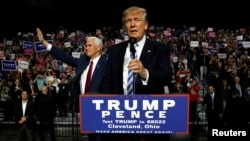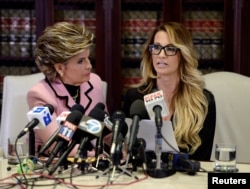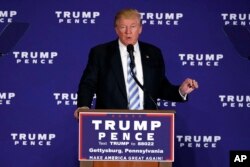Republican presidential nominee Donald Trump offered new immigration reform proposals Saturday and said he would cut taxes for middle-class Americans by 35 percent during his first 100 days in office, should he win the presidency in next month's election.
Trump also used the policy speech to say that after the election he would sue the nearly one dozen women who have come forward to accuse him of sexual assault.
He brought up the misconduct allegations again in the course of explaining how he would begin running the country if he won the election, telling his audience: "Every woman lied, the events never happened and all of these liars will be sued after the election."
Yet another woman emerged Saturday to say Trump had been sexually inappropriate with her 10 years ago when she met him at a golf tournament at Lake Tahoe in California.
Jessica Drake — an adult film actress — said Trump grabbed her and kissed her without her permission and later offered her $10,000 and the use of his private jet if she spent the evening with him. She said she declined his offer and is now coming forward "to add my voice, strength and my support to the other women coming forward."
Just 17 days before the November 8 election, Trump gave his policy speech in Gettysburg, Pennsylvania, near a Civil War battlefield site and where President Abraham Lincoln gave one of the most important speeches in U.S. history 153 years ago, setting out a new course for the United States after years of civil war that severely divided the nation.
Immigrants, sentencing
In his remarks, Trump said he would stem the flow of illegal immigrants into the U.S. by imposing a mandatory minimum prison sentence of two years for anyone who enters the country illegally. He would also require five-year minimum sentences for those with prior felony convictions, numerous misdemeanors, or two or more prior deportations.
"On November 8, Americans will be voting on this 100-day plan to restore prosperity to our country, secure our communities and [restore] honesty to our government," Trump said.
He also promised to impose term limits on members of Congress, enact a freeze on federal hiring, reduce federal regulations, and ban White House and congressional officials from becoming lobbyists after leaving office.
"We will drain the swamp in Washington, D.C., and replace it with a new government by and of the people," Trump declared.
Trump also vowed to cancel U.S. payments to U.N. climate-change programs and invest the money instead in the nation's water and environmental infrastructure.
'Closing arguments'
Campaign aides said the speech summed up his "closing arguments" to voters. Some analysts saw this as an attempt to shift attention back to his priority issues and away from the controversies that have dogged him.
Trump has also argued in recent weeks that next month's presidential election is rigged, and that he may not accept the outcome if he loses. He has provided no evidence for his claim the election will be rigged.
The real estate mogul-turned-politician created an uproar when he refused to say at Wednesday's final presidential debate that he would accept the results of the election. He later revised his position, saying he would agree to accept the results but also reserved the right to mount a legal challenge if he felt results showing he lost the vote were "questionable."
He also has accused the media of being biased and unfairly helping his opponent, Democrat Hillary Clinton. "They're trying desperately to suppress my vote and the voice of the American people," he said.
The Clinton campaign called the Republican's speech a troubling insight into a potential Trump presidency.
Clinton, a former U.S. secretary of state, and her running mate, Virginia Senator Tim Kaine, campaigned in Pittsburgh and Philadelphia on Saturday.
During a rally in Pittsburgh, Clinton made a pitch for Republican voters who are put off by the party's candidate.
She noted that many have been frustrated with Trump, who has struggled in the past few weeks after a recording of him using lewd language about women surfaced. "I understand that they need a president who cares about them, will listen to them, and I want to be their president," she said.
Surveys, polls
Political surveys and public opinion polls continued to show Trump trailing Clinton, both nationwide and in almost all battleground states. The website RealClearPolitics, which aggregates multiple surveys, estimated that Clinton was ahead of Trump by 6 or more percentage points among likely voters nationwide.
Beyond nationwide vote totals, the most important indicator of the presidential election's outcome is a state-by-state comparison, since those separate races will choose delegates to the Electoral College, which actually elects the president in a session several weeks after the popular vote on November 8.
The RealClearPolitics electoral map showed Clinton was expected to win 262 votes in the Electoral College compared with 164 for Trump, with no predictions yet for several states that could affect the outcome. Since the Electoral College is made up of 538 delegates, a successful presidential candidate must gain the support of at least 270 of them.
The States of the Nation project said Saturday that Clinton appeared to have a commanding lead in the Electoral College, or a 95 percent overall chance of winning. The group forecast an Electoral College vote of 326 to 212; another widely read politics website, FiveThirtyEight.com, predicted a final vote of 341 electoral votes for Clinton and 196 for Trump.







